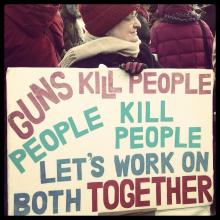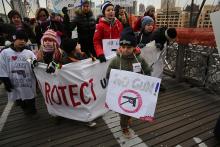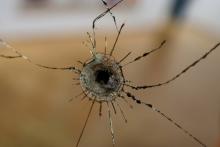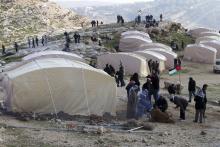Peace and Nonviolence
The Associated Press reports that the Senate has confirmed John Kerry as Secretary of State with a 94-3 vote. Earlier today, the Foreign Relations Committee unanimously approved the nomination. Kerry, a Vietnam veteran and five-term Senator, replaces Hillary Clinton as Secretary.

Over the weekend I joined more than 6,000 people in a march for common sense gun control legislation.
The ground was covered in snow and ice, air so cold we could see our breath, on Saturday morning as we marched silently from the Capitol Building to the Washington Monument. In front of me, 100 residents from Newtown Conn., carried signs that read, “We Are Sandy Hook.” By my side stood an elderly woman with a sign reading, “Guns kill people. People kill people. Let’s work on both TOGETHER.”
Behind me, beside me, and scattered throughout the crowd of silent marchers more than 1,000 simple white signs were also displayed — carrying the names of victims of gun violence who have been permanently silenced.
They were names like Charlotte Colton, a mother of three who was gunned down along with seven other people at a U.S. Postal Service facility in Goleta, Calif.
Names like Laura Webb, who was shot and killed in a salon while styling her mother’s hair in a massacre that killed eight people.
Names like Vanessa Quinn, 29, one of four victims gunned down in a mall in Utah while she was picking out her wedding ring.

The New York Times reports that the U.S. is preparing to establish a base in northwest Africa so that it can fly drone surveillance missions against the local affiliate of Al Qaeda and other Islamist extremist groups.
“For now, officials say they envision flying only unarmed surveillance drones from the base, though they have not ruled out conducting missile strikes at some point if the threat worsens. …
“A handful of unarmed Predator drones would carry out surveillance missions in the region and fill a desperate need for more detailed information on a range of regional threats, including militants in Mali and the unabated flow of fighters and weapons from Libya. American military commanders and intelligence analysts complain that such information has been sorely lacking.”
This morning, Reuters reports that Niger has given permission for the drones to be based in that country. According to a “senior government source,” the U.S. Ambassador to Niger made to the request to the country’s president, who accepted it.

Much has been said, since the massacre at Newtown, Conn., about our American culture of violence. It is no exaggeration. In 2012, the United States had three mass shootings within six months. According to a study published in the Washington Post, our nation’s gun murder rate is roughly 20 times the average of all other developed countries.
We should not be surprised. Not only have we created a culture of violence, we glorify violence in our movies, television shows, and video games. Even in pro sports, players increasingly settle disagreements on the court or field with physical altercations, reinforced by the cheers of raved fans.
The huge surge in gun sales, after President Barack Obama announced his intent to have Vice President Joe Biden make recommendations to curb gun violence, attests to the misguided fears of many Americans.
We have a paranoid citizenry who, like Sen. Rand Paul (R – Ky.), mistakenly falls into the delusion that arming more people with guns is the answer.
So here America is, coping with this assault on our sensibility, at a time during the year when we celebrate the teaching of the great civil rights leader the Rev. Dr. Martin Luther King, Jr. It was King who successfully applied the force of nonviolent resistance to end segregation in America, and it is his voice we must listen to in this time of increasing violence in our culture.
“Idolatry of guns.” What does that mean, exactly?
It might be hard to admit, but if you think about it, you can see that many groups in the United States see guns as sacred. Guns are not only the solution to our problems, they will save us from evil. Wayne LaPierre, the executive vice president of the National Rifle Association, stated this himself: “The only thing that stops a bad guy with a gun is a good guy with a gun.”
Do we really believe this? If we stop and think about it, we don’t. Our protection does not come from guns, and we do not live in a binary society of good and evil, where the right to hold dangerous weapons can be allocated to people who are entirely virtuous.

When I was in high school, my family moved from a Black Chicago Southside neighborhood fraught with gang tensions to a nice, multiracial middle-class community further south. Yet, my mom and dad still drove my brothers everywhere, so they would not get shot walking to the basketball court or to a friend’s home because of their shoes, their coat, or the color of their shirt. It was the ’70s and Marvin Gaye’s anthem asked the question on the minds of a generation: What’s going on?
Decades later, it is still my question. Six Sikhs killed in worship in Wisconsin. Thirty-three shot dead at Virginia Tech. Twelve killed and 58 injured in a movie theater in Aurora. One teacher and 12 students at Columbine. Six women, eight little boys, and 12 little girls in classrooms in Newtown. Those babies still had their baby teeth. What’s going on?
Marian Wright Edelman, president of the Children’s Defense Fund, cites these stats in her recent Huffington Post blog: 119,079 children and teens have been killed by gun violence in our nation since 1979. It is as though 4,763 classrooms of young people have been killed by guns. Twenty-two times more children and teens have been killed since 1979 than military personnel in the Iraq and Afghanistan wars combined. That cracks my heart wide open.
The shootings at Sandy Hook took our breath away. We felt in our hearts, this could happen to my child, to my neighbor’s child, and in my community. Unfortunately, in many communities, like my neighborhood in Chicago, we’ve known for a very long time that our children were in the line of fire.

Ben Emmerson, a U.N. special rapporteur, is beginning an investigation into drone strikes in Afghanistan, Pakistan, Yemen, and Somalia, according to the Guardian.
“About 20 or 30 strikes – selected as representative of different types of attacks – will be studied to assess the extent of any civilian casualties, the identity of militants targeted and the legality of strikes in countries where the UN has not formally recognised there is a conflict.
“The inquiry will report to the UN general assembly in New York this autumn. Depending on its findings, it may recommend further action. Emmerson has previously suggested some drone attacks – particularly those known as "double tap" strikes where rescuers going to the aid of a first blast have become victims of a follow-up strike – could possibly constitute a 'war crime.'"
Several nations, including Pakistan, have requested the investigation.

Several months ago, the Washington Post reported that presidential counterterrorism adviser John Brennan was developing a “playbook” of rules for drone attacks:
“The “playbook,” as Brennan calls it, will lay out the administration’s evolving procedures for the targeted killings that have come to define its fight against al-Qaeda and its affiliates. It will cover the selection and approval of targets from the “disposition matrix,” the designation of who should pull the trigger when a killing is warranted, and the legal authorities the administration thinks sanction its actions in Pakistan, Yemen, Somalia and beyond.”
On Sunday, the Post followed with a report that the playbook was nearing completion, and would provide clear rules.
“In Yemen, officials said, strikes have been permitted only in cases in which intelligence indicates a specific threat to Americans. That could include “individuals who are personally involved in trying to kill Americans,” a senior administration official said, or “intelligence that . . . [for example] a truck has been configured in order to go after our embassy in Sanaa.
“The playbook has adopted that tighter standard and imposes other more stringent rules. Among them are requirements for White House approval of drone strikes and the involvement of multiple agencies — including the State Department — in nominating new names for kill lists.”
But there is one exception to the new rules. The CIA drone program in Pakistan gets an exemption for at least a year. That exemption is described as “a compromise that allowed officials to move forward with other parts of the playbook.” The disputed point that apparently led to it was the CIA’s use of so-called “signature strikes,” attacks based on behavior seen as suspicious rather than in specific identified targets.
It also appears that the coming withdrawal of U.S. troops from Afghanistan will lead to more and more drone attacks. The Post quotes a former official involved in the playbook, “There’s a sense that you put the pedal to the metal now…”

While Washington, D.C., reveled in the ceremonies and parties surrounding Inauguration Day, U.S. drones were busy in Yemen. According to Reuters, four attacks in four days, from Saturday to Tuesday, killed at least 14 people. The attacks led to a protest blockade by angry tribesmen:
“On Sunday armed tribesman, angry at what they said was a drone attack on an area inhabited by civilians, blocked the main road linking Maarib with Sanaa. Earlier this month, dozens of armed tribesmen also took to the streets in southern Yemen to protest against drone strikes that they said had killed innocent civilians and fuelled anger against the United States.”
In another protest, Reuters reported a rare criticism of drone strikes by a member of the Yemeni cabinet. Human rights minister Hooria Mashhou, who was formerly a top activist in the movement that ousted President Ali Abdullah Saleh a year ago, said during a U.N. Yemen humanitarian appeal meeting in Dubai:
"I am in favour of changing the anti-terrorism strategy. I think there are more effective strategies. We're committed to fighting terrorism but we're calling for changing the means and strategies. These means and strategies can be applied on the ground without harming civilians and without leading to human rights violations."
The Vatican applauded President Obama’s gun control proposals. The Vatican continues to appeal for disarmament and morally supports firearm limits. The Huffington Post reports:
“The initiatives announced by the American administration for limiting and controlling the spread and use of weapons are certainly a step in the right direction,” the Vatican spokesman said.

John Brennan, President Obama’s counterterrorism advisor and nominee for CIA Director, is one of the architects of the administration’s drone policy. The New York Times and the ACLU recently lost a case in court that attempted to make public the secret legal memos that are claimed to justify the policy. The confirmation hearings coming up will offer another chance.
Salon reports that Sen. Ron Wyden, D-Ore., wrote a letter to Brennan in light of his nomination asking to see the legal opinions that justify killing American citizens. He wrote:
“Senior intelligence officials have said publicly that they have to authority to knowingly use lethal force against Americans in the course of counterterrorism operations, and have indicated that there are secret legal opinions issued by the Justice Department’s Office of Legal Counsel and explain the basis of this authority. I have asked repeatedly to see these opinions, and I have been provided some relevant information on the topic, but I have yet to see the opinions themselves.”
From a broader viewpoint, Mary Ellen O'Connell, law professor at the University of Notre Dame and a specialist on the international law of armed conflict, expresses surprise that anyone would need to see the memos. Comparing it to the legal memos that claimed to justify waterboarding and secret detention by the Bush administration, she writes:
“It is surprising to me that anyone feels the need to actually see these secret memos. International law clearly makes waterboarding, secret detention and targeted killing away from battlefields unlawful. The fact these practices have continued after the writing of the memos demonstrates the analysis is window dressing.”
But, she adds:
“The greater importance of the secret memos does not concern what they contain, but the fact our democratic government believes legal analysis can be secret -- that how the government understands the law that regulates its conduct need not be made public.”

Rep. Keith Ellison (D-Minn.) writes in a Washington Post op-ed of the many unanswered questions about drone strikes. He points out that:
“The heart of the problem is that our technological capability has far surpassed our policy. As things stand, the executive branch exercises unilateral authority over drone strikes against terrorists abroad.”
And as a way of changing that unilateral authority, he proposes three major points that should be considered by Congress to create a “legal framework to guide executive action.”
“First, we must do more to avoid innocent civilian casualties.
“Second, Congress must require an independent judicial review of any executive-branch 'kill list.'
“Third, the United States must collaborate with the international community to develop a widely accepted set of legal standards.”

Violence does not equal power.
Martin Luther King, Jr., understood this. Yesterday was King’s 84th birthday. This year the national holiday to honor him will coincide with President Barack Obama’s second inaugural ceremony. And, all of this happens in the wake of one of the worst mass shootings in the nation’s history. One month after the shootings at Sandy Hook Elementary School in Newtown, Conn. — which left 20 children and six adults dead, plus the killer’s mother, found dead in her home — the country grapples with the issue of gun violence. If the country is to come to consensus on the issue, we will have to distinguish between violence and power.
Vice President Joe Biden gave recommendations to the president regarding gun safety on King’s birthday. The questions the media are asking already abound: What recommendations can the president implement through executive order? Can an assault weapons ban pass Congress? Will victims and gun safety advocates be able to persuade Congress to pass meaningful legislation?
There will be varying interpretations of the Second Amendment, and there will be some who will argue that guns are necessary for self-defense. We will have the discussion as to whether or not the gun culture in the United States has taken on religious proportions.

WASHINGTON — Dozens of the nation’s faith leaders said on Tuesday that they’re ready to take on the gun lobby and demanded that politicians take quick and concrete steps to stem gun violence.
At a Capitol Hill press conference and in a letter to Congress, more than 45 clergy and heads of religious groups — representing the spectrum of American religious life — petitioned lawmakers to reinstitute a ban on assault weapons, require background checks on all gun buyers, and make gun trafficking a federal crime.
Organized by the two-year-old coalition Faiths United To Prevent Gun Violence, the signers said the slayings at a Newtown, Conn., elementary school last month had pushed them to redouble their efforts, and created an opportunity to beat back the gun lobby.
The Rev. Jim Wallis, the evangelical who heads the progressive Christian group Sojourners, took on Wayne LaPierre, the outspoken executive vice president of the National Rifle Association, directly.
LaPierre’s statement after Newtown that the “the only thing that stops a bad guy with a gun is a good guy with a gun” is “morally mistaken” and “religiously repugnant,” Wallis said.

Last week, while most of Israel was focused on increasingly extreme rhetoric surrounding the upcoming elections and most Americans were listening to angry debates about guns and fiscal responsibility, a remarkable thing happened. A few dozen Palestinians captured the world’s attention quietly and peacefully.
Their methods were simple and witty. Following the example of Israeli settlers, they established “facts on the ground.” The group of Palestinians quietly hiked up a barren hillside in cold, wet weather and pitched tents, declaring themselves part of the new village of Bab al-Shams, or Gate of the Sun, a name taken from the novel by Lebanese writer Elias Khoury.
Their village was established on private, Palestinian land and the landowner (who publicly displayed his Ottoman era deed) gave them permission to camp there. But that particular piece of land is also known on an Israeli development plan map as “E-1” and came to the attention of the world recently when Prime Minister Netanyahu announced plans to annex the land for Israeli settlements. Many believe that move, which would essentially bifurcate the West Bank, would be the deathblow to the “Two State Solution.”

For a number of months, I’ve reported and commented on news of drone strikes, the drone program, and legal and political challenges to it. But with the administration’s refusal to officially acknowledge the program, there’s a a lot we don’t know. Cora Currier at Pro Publica has an informative summary of what we know and what we don’t know about drone strikes.
Ross Douthat posits that President Obama’s nominations of former Sen. Chuck Hagel as Secretary of Defense and John Brennan as Director of the Central Intelligence Agency represent the synthesis of two strains in former President George Bush’s foreign policy. Hagel as one of those who turned against the war in Iraq, and Brennan as one of those who defended controversial counterterrorism policies.
“To the extent that it’s possible to define an “Obama Doctrine,” then, it’s basically the Hagel-Brennan two-step. Fewer boots on the ground, but lots of drones in the air. Assassination, yes; nation-building, no. An imperial presidency with a less-imperial global footprint.
“This is a popular combination in a country that’s tired of war but still remembers 9/11 vividly. Indeed, Obama’s foreign policy has been an immense political success: he’s co-opted foreign policy realists, neutralized antiwar Democrats and isolated Republican hawks.”
Counter-insurgency wars, such as those in Iraq and Afghanistan, frequently place soldiers in morally ambiguous situations. What they did or didn’t do in those situations can leave lasting moral effects. Following an epiphany at an antiwar rally, Rev. Rita Nakashima Brock:
“… has devoted the years since then to tending the spiritual wounds of warriors, seeking theological answers to the condition among veterans called “moral injury.” In her current position at Brite Divinity School in Fort Worth, she has begun the first program in the nation to develop a treatment that she terms 'soul repair.'
“Moral injury might best be defined as an affliction of the soul, as distinct from a specific mental health condition like post-traumatic stress disorder. It arises, to speak in a very broad way, from the way a combatant’s actions in war seem to violate and thus undermine the most deeply held moral beliefs.”
Her “Soul Repair Center” is now teaching congregational leaders how to address moral injury among veterans.

Since the start of the year, drone attacks in Pakistan have been escalating. In the first ten days of January, seven attacks have been reported.
Thursday morning, according to the Global News/AP:
“U.S. drone-fired missiles hit a house in Pakistan's northwest tribal region Thursday, killing five suspected militants, Pakistani intelligence officials said. It was the seventh such attack in less than two weeks.
“The recent spate of strikes has been one of the most intense in the past two years, a period in which political tensions between the U.S. and Pakistan led to a reduced number of attacks compared to 2010, when they were at their most frequent.”
Tuesday, The Bureau of Investigative Journalism reported:
“In twin strikes CIA drones killed at least six people, including up to two reported civilians. There were conflicting accounts of the events that night. Some sources reported there was a single strike that killed up to nine people. However multiple sources reported up to 17 missiles were fired on two close but separate targets at least 15 minutes apart. The first of the potentially coordinated attacks killed at least four in Haider Khel village shortly after midnight. …
“The Agency’s drones killed at least two people in the second strike in nearby Hesso Khel village. As many as 11 missiles were fired on a ‘two room house‘ belonging to Noor Mohammed – his fate was not reported. Villagers said there was no way to tell the identity or nationality of the ‘mutilated bodies’. Many drones were reportedly seen overhead after the strike making tribesmen panic.”

The United Nations wants to use drones in peacekeeping missions, but some developing countries are opposed, fearing that it will become a new way for Western countries to gather and control intelligence. According to the Washington Post:
“The United Nations, looking to modernize its peacekeeping operations, is planning for the first time to deploy a fleet of its own surveillance drones in missions in Central and West Africa. The U.N. Department of Peacekeeping has notified Congo, Rwanda and Uganda that it intends to deploy a unit of at least three unarmed surveillance drones in the eastern region of Congo.”
As the tension between China and Japan over disputed islands increases, both are in a “drone race.” The Guardian reports:
“Drones have taken centre stage in an escalating arms race between China and Japan as they struggle to assert their dominance over disputed islands in the East China Sea. China is rapidly expanding its nascent drone programme, while Japan has begun preparations to purchase an advanced model from the US. Both sides claim the drones will be used for surveillance, but experts warn the possibility of future drone skirmishes in the region's airspace is "very high".
USA TODAY notes a “global arms race” in acquiring drones:
“The success of U.S. drones in Iraq and Afghanistan has triggered a global arms race, raising concerns the remotely piloted aircraft could fall into unfriendly hands, military experts say. The number of countries that have acquired or developed drones expanded to more than 75, up from about 40 in 2005, according to the Government Accountability Office (GAO), the investigative arm of Congress.”